Faculty Job: Myths & Realities – an interview with Mary Heskel
About you
Describe your journey from student to newly appointed faculty
I started my undergraduate degree somewhat begrudgingly taking introductory biology at the University of Pennsylvania. Half of that introductory course was taught by Dr. Scott Poethig, a corn geneticist, whose lectures forced me to think about plants in a new light. I continued taking more biology courses, including a rainforest ecology course during a study-away semester at James Cook University in Townsville, Queensland. Around this time, I was also tutoring local K-12 students on a weekly basis, and unsure of my next steps. I enjoyed and connected to teaching, but also wanted to continue learning about plants and ecosystems. After graduation, I joined the New York City Teaching Fellows, and taught ninth grade biology in an under-resourced public high school for two years. During this time, I attended night and summer school to earn a Masters in Education from the City College of New York. Teaching ninth graders required a level of energy, creativity, and breadth of knowledge that I still draw on as a new faculty member at a liberal arts college. To integrate my desire to continue teaching and also pursue research questions on plants and their environments, I applied to ecology graduate school programs for a PhD. My desire to stay in New York City and an excellent opportunity to do field work in Arctic Alaska landed me at Columbia University in the Ecology, Evolution, and Environmental Biology program working with Kevin Griffin and Hilary Callahan. After two years of developing new classes for ninth graders and commuting for night school, grad school initially was a relief! I had time to think, was back in classes full time – and, surprise, I love being a student – and generally there was a lot less yelling and cleaning up papers off of the floor. I also benefited from having really wonderful advisors in Kevin and Hilary, who modeled boundaries, prioritizing family life, and treating colleagues and students with respect and kindness.
After graduate school, I started a 1-yr postdoc at Australian National University working with Owen Atkin, another fantastic advisor. This appointment included months of fieldwork, and then leading data-analysis and writing for a large, collaborative project. I loved working at ANU – as a plant physiologist, the faculty and resources are just incredible. After this position, I started a fellowship-based postdoc at the Ecosystems Center of the Marine Biological Laboratory in Woods Hole, MA. Here, I developed original research projects and expanded both the scale of my focus and my collaborative network. I also was able to mentor undergraduates during this position, confirming my interest in merging research with teaching and mentoring for my career.
Currently, I am a first-year faculty member at Macalester College in Saint Paul, MN. I feel lucky to have landed in this school and this position, and look forward to developing my career, lab, and relationships with colleagues and students.
What inspired you most to pursue your current career?
At some point, though there is no specific memory, I wanted to be some kind of expert who could help people. Teaching and research seemed like a natural progression, but was not immediately clear to me when I was younger. I do not like to work in isolated settings, and really value engaging with and connecting to students in classes and research activities.
Which conferences do you regularly attend?
Mostly Ecological Society of America, where I hang with the very active Physiological Ecology section and loiter around the LiCor booth. Also, the American Geophysical Union, in the Biogeochemisty section, and similarly hang around the LiCor booth. I will also try to attend any relevant New Phytologist Symposia or Workshops – which are excellent small meetings. I’ll be attending my first ASPB meeting next year in 2020!
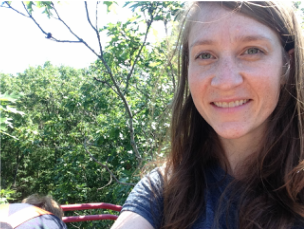
About your job hunt
How long did it take you from the beginning of searching faculty jobs to get one?
Much longer than I anticipated and much, much longer than I preferred. I applied my first year out of my PhD in the 2013-2014 season to a handful of jobs, and continued until I was offered a position during the 2017-2018 hiring season – which I personally refer to as my “Hail Mary” application round, as I was planning to leave academic science if nothing worked from those applications.
During your job hunt, what did you learn about yourself or about the process of finding an academic job?
I learned a lot about the process – it is so competitive, and there are so many qualified, amazing candidates out there. Many jobs I applied to had 100-250 applicants. Honestly, it was demoralizing to get rejected repeatedly, especially from positions I wasn’t even sure I wanted. Also, the system is hard to understand because you rarely, if ever, get feedback on your interviews. I interviewed on campus for two jobs when I was pregnant, and one when I was breastfeeding my 4-week old daughter, and another later when I was pumping but could travel independently. Traveling to interview with a 4-week old really made me question my motivations – the physical and mental stress might not have been worth it during a time I should have been focusing on my health and rest. The search is brutal, and I have no advice to help applicants except to take care of yourselves and prioritize your values! Thankfully, upon receiving an offer, years of stress vaporized. Also, the temporary nature of post-doc positions compounds stress, as you might be looking for another temporary-position, applying for grants, getting all your publications out, and applying for long-term positions simultaneously.
Based on your experiences and the feedback you got during the job search, what do you think are key skills and accomplishments that a successful candidate must demonstrate?
Given the competition, I’m sure luck, or, ahem, ‘stochastic events’, play a large role. It is difficult to interpret what job postings are actually looking for, and some are intentially vague (ie – ‘all kinds of plant biology’). An ad might say “Plant Ecologist”, but that implies dozens of sub-disciplines – physiology, plant-pollinator relationships and reproduction, mycorrhizal research, nutrient dynamics, spatial ecology, etc. I did notice I got more interview requests after having a first-author high impact publication.
Make your cover letter and job documents ‘shine’ as much as you can. Feedback from interviews where I was not offered a job (which I sought out through email and phone calls – it is unlikely you will get more than a form email) were along the lines of “your research is narrower than what we are looking for”. How respiration, a process that basically unites all eukaryotic life, is a narrow topic confuses me, but perhaps how I presented it did not include all the interests of the search committee and department. It is very likely there were elements of my interviews that were not as strong as other candidates (research integration or collaboration with people in the department, proven track record of grant funding, etc), but it is unlikely you will get clear feedback on those elements. I wish there was more concrete advice I could provide, but the process is generally opaque, and it is hard to know why or how decisions are made.
Advice for job applicants
Beyond your research and publications, how did you prepare for the academic job hunt during your postdoc?
Applications take a lot of time. I recommend getting your cover letter, research description, and teaching philosophy in top shape – which might take a while. After that, alter your applications to fit the announcement – it is small or large institution? Do they have a field site you are likely to use? Are there elements about the institution that are especially attractive to you? Every year, I emailed my letter writers a list of the jobs I was likely to apply to with dates next to them, so it was on their horizon, and then reminded them as dates approached.
Also, it can be hard getting yourself excited – so make sure to find activities in and out of work that are exciting to you and lean on those when things get tough!
About you as a faculty member
What qualities do you look for when recruiting for your lab?
I work with undergraduates, so it isn’t the same long-term commitment as working with a graduate student. I’m interested in students that might not initially identify as ‘scientists’ – as I didn’t either – but are interested in developing new questions and working hard to get answers. I look for students who are up for challenges and are curious about plants, ecosystems, and climate change.
How do you manage “work-life balance” as a faculty?
I’m not sure I am balancing it now! Hopefully in the future I’ll get a handle on this. I prioritize family – my partner and 2-year old daughter – as much as I can, but developing new courses, applying to grants, and managing time is especially challenging as a new faculty member.
Whom do you like to thank for supporting and inspiring you along this journey?
My partner, Will Longo, was and is a steadfast support. My parents and sister, who were often baffled by the competitiveness of these jobs – often in locations I never expressed interest in and for lower-than-expected salaries. And my large network of friends from college, grad school, teaching, and my postdoc years – it is hard to explain the academic job search to people who aren’t ‘in it’. Having that support network is invaluable.
If prospective students and postdocs want to reach you, where can they contact you and read about your work?
Email: [email protected]
Twitter: @maryheskel
Lab website: www.maryheskel.com


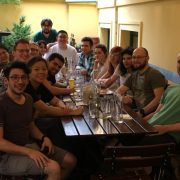
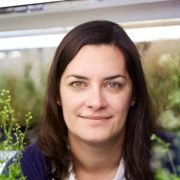
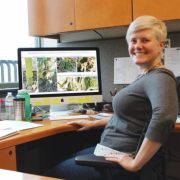
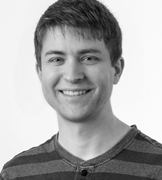
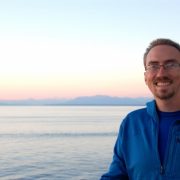



Leave a Reply
Want to join the discussion?Feel free to contribute!